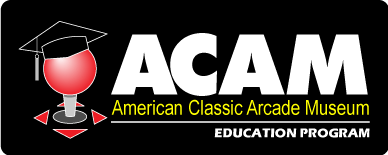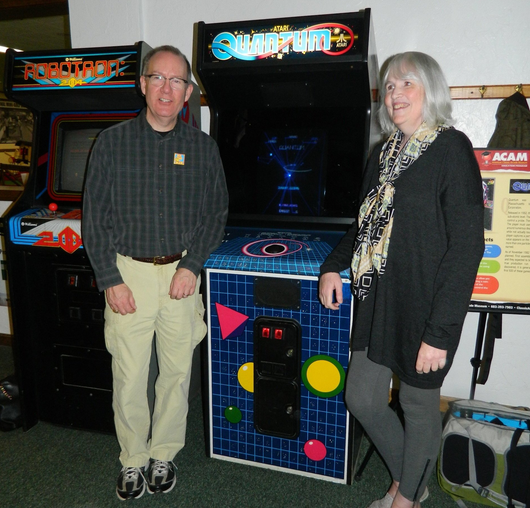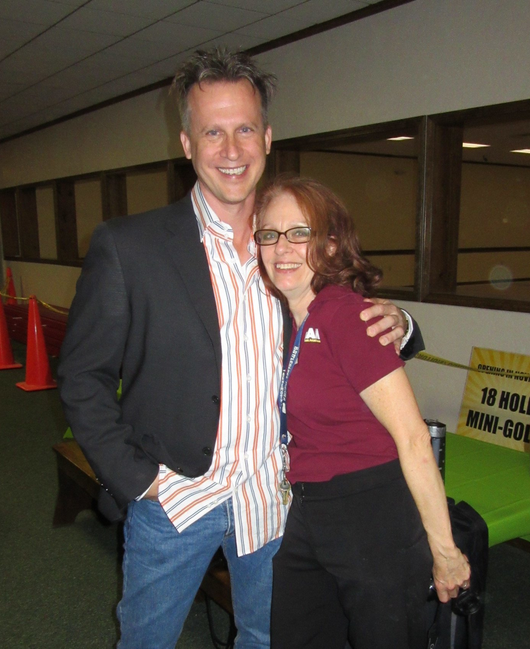ACAM Education Program
The latest figures from the Entertainment Software Association (ESA) and The NPD Group show that the video game industry eclipsed the movie industry on a revenue front during 2018. The video game industry earned $43.4 billion in revenue altogether, nearly four times the money made by the top 100 movies of 2018.
Established in 2009, the Education Program at the American Classic Arcade Museum (ACAM) has been teaching video game history to students who wish to pursue career options in the video game industry, or for anyone who has a love of video game history.
Co-Creator of Midway's "Ms. Pac-Man" Steve Golson (l) and Creator of Atari's "Quantum" Betty Ryan Tylko (r) at a recent ACAM Education Day event
With visiting groups as small as 20 and as large as 200, ACAM tells the story of the origins of the videogame industry. ACAM opens the vault for these student groups so they can see the beginnings of video games such as the Ralph Baer “Brown Box” that led to the first video game console, or with early video games such as “Computer Space” or “Pong.” Depending on the size of your group, ACAM can make arrangements for a developer of those early games to speak about what was involved in early video game creation.
Mike Stulir, Vice President of the American Classic Arcade Museum feels that learning the basics of the birth of the industry is key for those looking to enter the videogame development workforce. “I have always maintained that it is really hard to comprehend where we are going until we fully understand where we have been. We provide an environment where students can study the games of yesterday and learn specifics of game creation from some of the people that made these games back in the late 70s/early 80s.”
Eric Pribyl (l), lead programmer for Midway's "Cruis'n USA" and "Cruis'n World" with Tina Gebhard, ACAM Treasurer, during a recent ACAM Education Day event.
If you would like to have your college, high school, vocational school or at-risk youth organization visit ACAM for a day of learning about classic video games, please contact ACAM President Gary Vincent at gary@classicarcademuseum.org.
Classic Arcade Games as an Educational Tool
Museum Teaches the Origins of the Video Game Industry
Reprinted with permission from RePlay Magazine.
ACAM is looking for the next great game developer.
Granted, it is a lofty goal, but it is one of the important functions of the Education Program at the American Classic Arcade Museum (ACAM). Founded in 1998 and located north of Boston in Weirs Beach, NH, ACAM is the first 501(c)3 non-profit organization dedicated to the preservation & play of classic arcade games.
As part of its mission goals, ACAM established a program to educate students in the history of arcade games & the video game industry. Since 2009, ACAM routinely hosts student groups from around New England such as colleges, high schools, vocational schools & at-risk youth organizations.
“The Education Program is one of the most rewarding things we do,” stated Gary Vincent, President of ACAM. “We are so happy to offer this program; not just for the students studying to enter the video game business, but for the benefit of game development companies looking for the talent to create the next generation of games. We are firm believers that you cannot appreciate where we are going until you understand where we have been. This program is a unique way for teaching the origins of the video game industry to college students preparing to enter the game development workforce.”
One of the major participants in this program is the Game Studio at Champlain College in Burlington, VT. The Game Studio offers four undergraduate majors in game development: Game Design, Game Art & Animation, Game Programming, and Game Production Management. Champlain College has been sending groups of students to ACAM for the past six years. Recently, another group of 200 students visited ACAM for a day of learning about video games.
Jonathan Ferguson, a Professor at Champlain College since 2008, is proud of the Game Studio accomplishments. “The Game Studio at Champlain College is a nationally recognized and award winning program. We regularly rank in the top 20 Game Development programs in the Princeton Review. Alumni of The Game Studio now work at nearly every major game studio in North America. Game industry studios and recruiters love the collaborative and creative skills of Champlain's graduates, and return year-after-year to interview and hire graduating seniors.”
As part of the Education Program, ACAM assists student groups by presenting the full classic arcade experience. “The American Classic Arcade Museum offers a comprehensive collection and a uniquely authentic experience of a classic video arcade” said Ferguson. “The rotating collection at ACAM offers a rare treat every visit, giving a hands-on, first-hand experience of what an arcade in 1980 was like. From the red-gels over the lights, to the '80's music, to the rows and rows of arcade video games and pinball, the experience of the classic arcade is very accurately replicated. ACAM is not like a museum with exhibits behind glass; it is hands-on, allowing you to interact with every exhibit on display. You can play games that are, astonishingly, still working 30-40 years after their three year design life ended.”
One of the ways these students learn about classic arcade games during their ACAM visit is by hearing stories of creating these games directly be the people who created them. Former developers such as Steve Golson (Midway’s Ms. Pac-Man), Jonathan Hurd (Atari’s Food Fight), Betty Ryan-Tylko (Atari’s Quantum) and Eric Pribyl (Midway’s Cruis’n USA) have been kind enough to come to ACAM and provide lectures to these students. Furthermore, written classroom materials have been provided with the experiences of former developers such as Warren Davis (Gottlieb’s Q*Bert), Mike Hally (Atari’s Star Wars), Noah Falstein (Williams’ Sinistar), Owen Rubin (Atari’s Triple Hunt) and Jed Margolin (Atari hardware engineer.)
“We have been very fortunate that so many legends in arcade development have agreed to contribute to this program,” said Vincent. “Steve Golson, in particular, has been a shining star in our work with Champlain College. The response from these former developers has been better than we ever hoped and the students love hearing about how games were developed in the past. We look to expand upon participation of game development alumni in the future.”
And what do the students think? Andersen Pinckney of Richmond, VT is a game design major. “My inspiration to become a game design student started out as a business major.” said Pinckney. “I wanted to be involved with new ways of creating media and communicating ideas to the public. I heard about Champlain's Game Academy and immediately fell in love with the program. I love making ideas for new games and fun addition to games, so it seemed like a fit for me.”
Pinckney had little experience with arcade gaming prior to his visit. Most of what he knew came from the “Midway Arcade Treasures” collection on the Xbox. Did his ACAM visit help him to discover some new things? “I felt like the trip to ACAM dragged me back to a time where arcades were popular. It was interesting to feel like I could live in someone's shoes 35 years ago. It was a more of a trip to show perspective than to learn about individual games. I did enjoy the developer lectures throughout the trip about the creation of arcade games.”
Another student, Genevieve Jackson of New York, NY is studying game art. “My desire is to create media so beautiful and vulnerable such that it opens the hearts of all who witness it. I want my offerings to be medicine for the emotional hurts and painful misgivings we carry about ourselves, each other, and the world we share. I want to create opportunities to empathize and connect with one another, to rediscover the wonder of the world we share, and have an amazing time doing so.”
Jackson came away with a new perspective older video games. “Taking on the classics, many of which were disarmingly simple in style and gameplay, was refreshing. Without all the flashy details I'm used to, it felt like the adrenaline rush was magnified. I got visceral proof that less can definitely be more. Visually, and even game-play wise, as a developer it's not necessary to create something complex to make a great game. What's awesome, is the merit in applying that logic universally, outside the bounds of game development. Apparently it's possible to have a sea-change in worldview by visiting the ACAM.”
Like Pinckney, Jackson also relished the environment of the museum. “It was really cool to see families, and multiple generations of people enjoying the space. I can imagine how inspiring and heartening it is for older generations to share parts of their childhood, and the ingenuity of their time.
Vincent is pleased with what has been accomplished so far, but he is aware of what is required to take this program to the next level. “Our educational events have been a labor of love for our staff and our volunteers. On our own, we have come a long way in a short time period. However, in order to expand this program, we need sponsorship help from the game industry to help with the costs of teaching these students. Financial help from gaming companies & guest speakers from the video game business will be key to offer this program to more New England-area institutes of higher learning.”
Ferguson believes the future is bright for the ACAM Education Program. “An arcade game must be experienced in the context for which it was designed to really understand why developers made the decisions they did. From control interfaces to display technologies, these artifacts must be played, in context, to be fully understood. The Game Studio faculty plan to continue working with ACAM to share the experience of the ‘Golden Age of Arcades’ with our first-year students for many years to come. The hard work of Gary Vincent and the volunteers of the ACAM really helps to create an eye-opening and deep educational experience.”
For more information on how you can help the ACAM Education Program, to offer sponsorship, or to arrange a visit for your student group, please contact ACAM President Gary Vincent at gary@classicarcademuseum.org.








